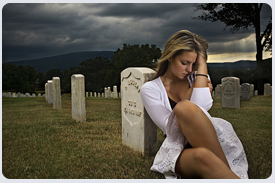“Pastor, we want you to conduct a celebration of life service. We don’t want a funeral service that focuses on daddy’s passing. We want a happy atmosphere!”
I cannot tell you how many times I’ve heard this request from family members whose love one just died and they were in my office planning the funeral of that loved one.
To be quite honest I was never comfortable being put in this position. Not as a Christian pastor I wasn’t.
Let me explain.
There seems to be a universal resistance to the reality of death in our society and how we talk about death.
Just listen to the ways we talk about the death of a loved one:
“Daddy went to heaven.”
“Mother passed."
“My grandmother went to be with the Lord.”
“God called my grandfather home.”
“My wife or husband passed away.”
While all these death euphemisms may be true and necessary in the early stages of grief they do nothing but keep us in a perpetual state of denial, or at least in partial denial.
What is so awful with just saying: “Mother died?” That’s what she did isn’t it?
Now before you accuse me of being too insensitive or cold hearted hear me out.
When a grieving family requests of me to conduct a funeral as a “celebration of life” I hear that as code for:
“Please don’t talk about death at the funeral pastor. We don't want Mama's funeral to be a sad service."
Now as a Christian pastor conducting a funeral without talking about the person’s death is like skipping or ignoring Good Friday in order to get right to Easter.
Think about it.
How can we celebrate the wonderful resurrection of Jesus without also confronting the harsh realty of his death?
We can’t. We shouldn’t.
Jesus’ death is as much a part of his life as his resurrection is.
Easter makes absolutely no sense without Good Friday.
Truth is Jesus died. Period!
There is no easy way to say it.
In fact the Apostle Paul referred to Jesus’s death in the following manner:
“For I decided to know nothing among you except Jesus Christ, and him crucified”
Before Paul could talk about Jesus’s resurrection he had to discuss his death.
But here’s the Good News: God raised Jesus from the dead!
God raised him from the dead! He didn’t raise himself rather God did it. A point too often missed among Christians.
Now what’s this mean for us today?
We should not be afraid or reluctant to talk about death in realistic ways. When my mother died in 1983 that was a harsh reality I had to come to terms with and I had to learn to talk about it for what it really was:
She died!
Yes it took me a while before I was able to say the “D” word but once I did I discovered a healing process beginning to take place in my grief.
But here’s the thing: For a Christian death is not the final word and this is why we should never be afraid or reluctant to talk about it in straightforward ways.
The "D" word is not so bad after all.
Maybe not at first but sooner rather than later is so important.
In fact, it is generally accepted among grief counselors that folks tend to work through their grief in healthier ways when they can talk about their loved one’s death without the use of soft euphemisms.
Refusing to use the “D” word only postpones resolution in the grief process. It prevents us from learning how to accept the harsh reality of death.
It’s just not healthy.
So when families requested that I do a celebration of life service only I would tell them very kindly and gently that yes we would celebrate their loved one’s life, but we had to talk about their dying before we could talk about their resurrection.
I then talked with them about the connection between Good Friday to Easter Sunday.
I never got one push back.

No comments:
Post a Comment